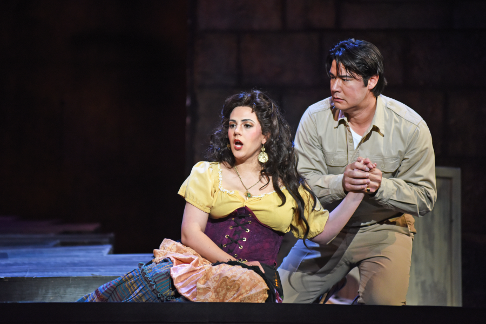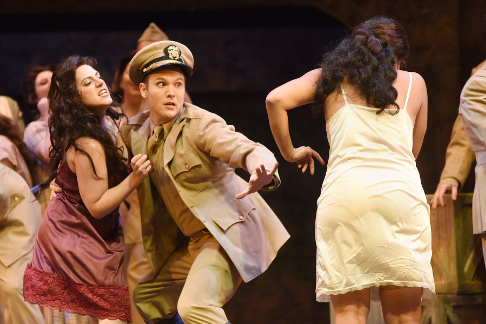Recently in Performances
English Touring Opera are delighted to announce a season of lyric monodramas to tour nationally from October to December. The season features music for solo singer and piano by Argento, Britten, Tippett and Shostakovich with a bold and inventive approach to making opera during social distancing.
This tenth of ten Live from London concerts was in fact a recorded live performance from California. It was no less enjoyable for that, and it was also uplifting to learn that this wasn’t in fact the ‘last’ LfL event that we will be able to enjoy, courtesy of VOCES8 and their fellow vocal ensembles (more below …).
Ever since Wigmore Hall announced their superb series of autumn concerts, all streamed live and available free of charge, I’d been looking forward to this song recital by Ian Bostridge and Imogen Cooper.
Although Stile Antico’s programme article for their Live from London recital introduced their selection from the many treasures of the English Renaissance in the context of the theological debates and upheavals of the Tudor and Elizabethan years, their performance was more evocative of private chamber music than of public liturgy.
Evidently, face masks don’t stifle appreciative “Bravo!”s. And, reducing audience numbers doesn’t lower the volume of such acclamations. For, the audience at Wigmore Hall gave soprano Elizabeth Llewellyn and pianist Simon Lepper a greatly deserved warm reception and hearty response following this lunchtime recital of late-Romantic song.
For this week’s Live from London vocal recital we moved from the home of VOCES8, St Anne and St Agnes in the City of London, to Kings Place, where The Sixteen - who have been associate artists at the venue for some time - presented a programme of music and words bound together by the theme of ‘reflection’.
'Such is your divine Disposation that both you excellently understand, and royally entertaine the Exercise of Musicke.’
‘And there was war in heaven: Michael and his angels fought against the dragon; and the dragon fought and his angels, And prevailed not; neither was their place found any more in heaven … that old serpent … Satan, which deceiveth the whole world: he was cast out into the earth, and his angels were cast out with him.’
There was never any doubt that the fifth of the twelve Met Stars Live in Concert broadcasts was going to be a palpably intense and vivid event, as well as a musically stunning and theatrically enervating experience.
‘Love’ was the theme for this Live from London performance by Apollo5. Given the complexity and diversity of that human emotion, and Apollo5’s reputation for versatility and diverse repertoire, ranging from Renaissance choral music to jazz, from contemporary classical works to popular song, it was no surprise that their programme spanned 500 years and several musical styles.
The Academy of St Martin in the Fields have titled their autumn series of eight concerts - which are taking place at 5pm and 7.30pm on two Saturdays each month at their home venue in Trafalgar Square, and being filmed for streaming the following Thursday - ‘re:connect’.
The London Symphony Orchestra opened their Autumn 2020 season with a homage to Oliver Knussen, who died at the age of 66 in July 2018. The programme traced a national musical lineage through the twentieth century, from Britten to Knussen, on to Mark-Anthony Turnage, and entwining the LSO and Rattle too.
With the Live from London digital vocal festival entering the second half of the series, the festival’s host, VOCES8, returned to their home at St Annes and St Agnes in the City of London to present a sequence of ‘Choral Dances’ - vocal music inspired by dance, embracing diverse genres from the Renaissance madrigal to swing jazz.
Just a few unison string wriggles from the opening of Mozart’s overture to Le nozze di Figaro are enough to make any opera-lover perch on the edge of their seat, in excited anticipation of the drama in music to come, so there could be no other curtain-raiser for this Gala Concert at the Royal Opera House, the latest instalment from ‘their House’ to ‘our houses’.
"Before the ending of the day, creator of all things, we pray that, with your accustomed mercy, you may watch over us."
The doors at The Metropolitan Opera will not open to live audiences until 2021 at the earliest, and the likelihood of normal operatic life resuming in cities around the world looks but a distant dream at present. But, while we may not be invited from our homes into the opera house for some time yet, with its free daily screenings of past productions and its pay-per-view Met Stars Live in Concert series, the Met continues to bring opera into our homes.
Music-making at this year’s Grange Festival Opera may have fallen silent in June and July, but the country house and extensive grounds of The Grange provided an ideal setting for a weekend of twelve specially conceived ‘promenade’ performances encompassing music and dance.
There’s a “slide of harmony” and “all the bones leave your body at that moment and you collapse to the floor, it’s so extraordinary.”
“Music for a while, shall all your cares beguile.”
The hum of bees rising from myriad scented blooms; gentle strains of birdsong; the cheerful chatter of picnickers beside a still lake; decorous thwacks of leather on willow; song and music floating through the warm evening air.
Performances
![Daniela Mack as Carmen [Photo by Tim Trumble]](http://www.operatoday.com/Carmen%2035.png)
19 Feb 2016
Arizona Opera Presents an Interesting Carmen
Henri Meilhac and Ludovic Halévy, based their libretto for Georges Bizet’s opera Carmen on a novella of the same title by Prosper Mérimée. On March 3, 1875, Carmen was premiered at the Opéra-Comique in Paris.
Because the subject matter was considered vulgar and inappropriate for the Comique’s family-oriented audience, it was not well received. The opera’s depiction of lawlessness and immorality broke new ground in French opera. Carmen would later be considered the bridge between opéra-comique and the verismo style of late nineteenth century Italian opera.
Although Carmen was not revived in Paris until 1883, productions outside of France drew large audiences before that and the opera was soon on its way to becoming the immensely popular work it is today. According to Operabase, Carmen is now the world’s second most popular opera. The only opera that is more popular than Carmen is Verdi’s La traviata.
On February 5, 2016, Arizona Opera presented Carmen in an updated but otherwise traditionally realistic production directed by Tara Faircloth. Douglas Provost’s functional set allowed the story to unfold in a straightforward manner.
 Daniela Mack and Adam Diegel as Carmen and Don José.
Daniela Mack and Adam Diegel as Carmen and Don José.
As Carmen, Daniela Mack sang her lines with an exquisite palette of colorations and smooth dynamic range. A singer with dark hued sultry tones, she also had a fine sense of French style. Her personality could have been more fiery and her acting more intense in the dramatic scenes, but she did keep all eyes upon her when she sang. Her renditions of the Habañera and Seguidilla established her passionate nature and the deviousness of her character and she continued to emphasize Carmen’s fickleness as the plot unfolded. Her Chanson Bohème showed her love of unrestricted freedom and her Card Song proved her belief in the power of fate.
Adam Diegel was a rough-edged and dramatic Don José whose burnished, virile sound rang free throughout the auditorium. He delivered his lines with dramatic conviction and his acting conveyed considerable emotional impact. The Micaëla, Karin Wolverton was a great deal more than a simple country girl who wanted to marry a soldier. A brave and feisty young woman, she readily faced the dangers of looking for her boy friend among a band of soldiers and searching for him at night at an international border crossing. Best of all, Wolverton sang with silvery tones that blossomed into exquisite top notes.
 Daniela Mack and Joseph Lattanzi as Carmen and Morales
Daniela Mack and Joseph Lattanzi as Carmen and Morales
Calvin Griffin as Zuniga and Joseph Lattanzi as Morales contributed effective portraits as two of the coarse, unrefined soldiers. Ryan Kuster gave a strong impression as the handsome and charismatic celebrity, Escamillo. The difficult tessitura of the Toreador Song seemed easy for him as he sang it to his fans at Lillas Pastia’s Tavern. Amy Mahoney and Alyssa Martin as Frasquita and Mércèdes, Joseph Lattanzi and Andrew Penning as El Dancaïro and El Remendado handled their assignments with alacrity. Together with Mack as Carmen the group gave a strong rendition of the tricky Quintet.
Henri Venanzi’s chorus was well prepared and sang in fine French style, but they tended to move as a group rather than as individuals. Conductor Keitaro Harada gave a balanced reading of the score that had a lucidity of musical detail and a good helping of emotional tension. He gave every phrase its proper shape and drew especially fine playing from the orchestra in the delightful entr'acte that opens the third act.
Audiences never seem to tire of Carmen and it always seems to retain its power to quicken the pulse. The many bows and the standing ovation that greeted Arizona Opera’s fine cast at the end of this performance only serve as a reminder of the opera's well deserved place in the repertoire.
Maria Nockin
Cast and production information:
Carmen, Daniela Mack; Don José, Adam Diegel; Escamillo, Ryan Kuster; Micaela, Karen Wolverton; Morales/El Dancaïro, Joseph Lattanzi; El Remendado, Andrew Penning; Frasquita, Amy Mahoney; Mércèdes, Alyssa Martin; Zuniga, Calvin Griffin; Conductor, Keitaro Harada; Director, Tara Faircloth; Lighting and Scenic Director, Douglas Provost; Projection Designer, S. Katy Tucker; Chorus Master, Henri Venanzi; Fight Director, Andrea Robertson.
![Daniela Mack as Carmen [Photo by Tim Trumble]](http://www.operatoday.com/Carmen%2035.png)

